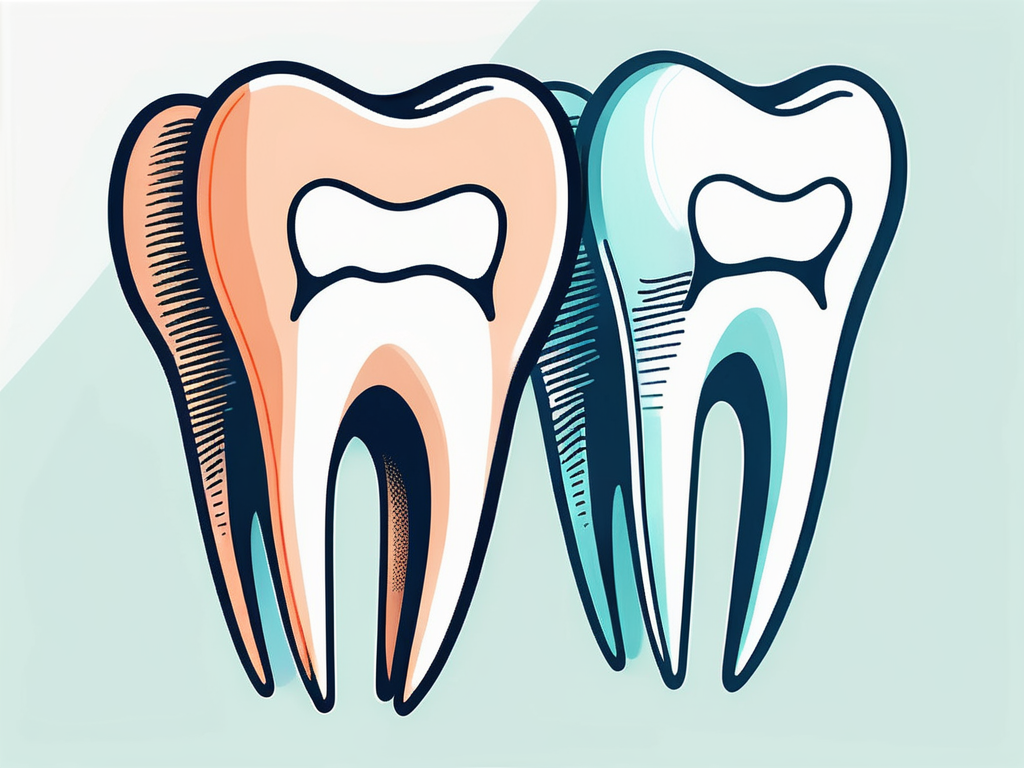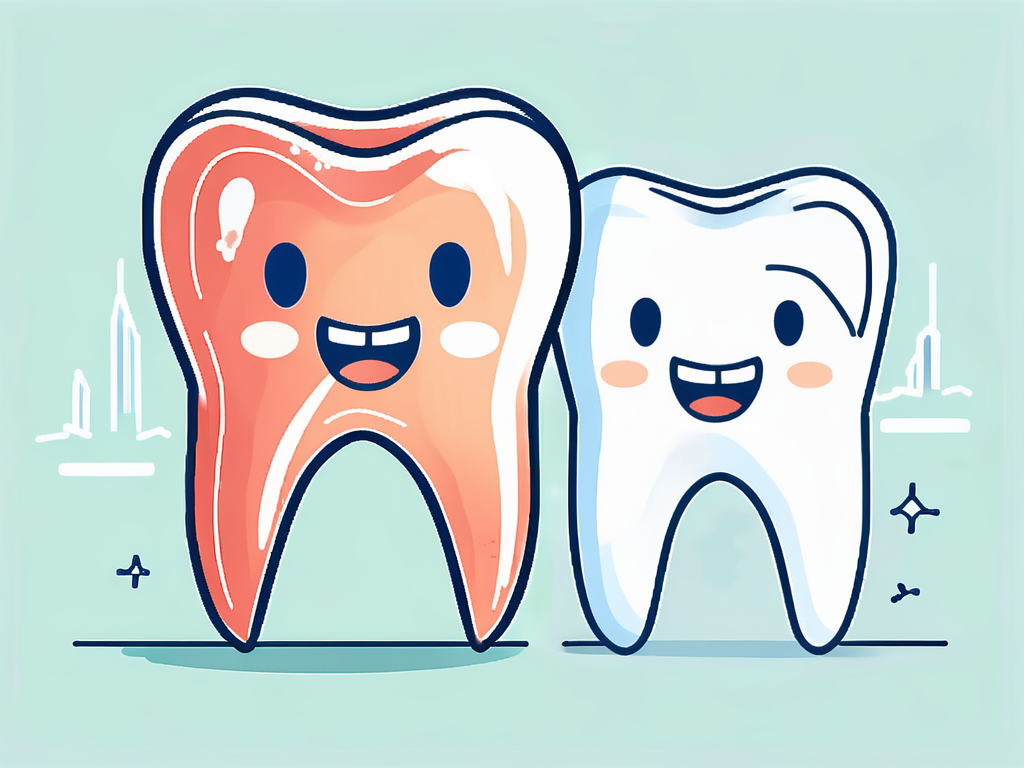Mouth guards are a common dental appliance used to protect teeth from grinding and clenching during sleep. However, there have been concerns raised about whether mouth guards can actually have a negative impact on your bite. In this article, we will explore the purpose of mouth guards and their potential effects on your bite. We will also discuss how to prevent bite problems when using mouth guards and when to consult with dental professionals.
Understanding the Purpose of Mouth Guards
Mouth guards, also known as occlusal splints, are custom-made devices that fit over your teeth to provide a cushioning effect and protect them from the harmful forces of grinding and clenching. They are primarily designed to alleviate symptoms associated with a condition called bruxism, which includes tooth wear, jaw pain, and headaches.
Bruxism, often referred to as teeth grinding or clenching, is a common condition that affects both adults and children. It can occur during the day or, more commonly, at night during sleep. The repetitive motion of grinding can lead to worn enamel, tooth sensitivity, and even fractures in severe cases. Mouth guards serve as a preventive measure to reduce the impact of bruxism on your dental health.
The Role of Mouth Guards in Dental Health
Mouth guards play a crucial role in maintaining dental health for individuals who grind or clench their teeth. By creating a barrier between the upper and lower teeth, mouth guards help to minimize the damage caused by the excessive forces exerted during bruxism. They act as a buffer and absorb the impact, preventing further wear and tear on the teeth.
Furthermore, mouth guards can also help alleviate associated symptoms such as jaw pain, headaches, and muscle tension. By providing a cushioning effect, they reduce the strain on the jaw muscles and joints, promoting relaxation and comfort during sleep. This not only improves your oral health but also enhances your overall well-being.
Common Misconceptions about Mouth Guards
Despite their benefits, there are some misconceptions surrounding mouth guards and their potential impact on your bite. One common misconception is that wearing a mouth guard can alter your bite permanently. However, when properly fitted and used, mouth guards should not cause any permanent changes in your bite or jaw alignment. Your dentist will ensure that the mouth guard is correctly designed to maintain the natural position of your bite.
It is important to note that mouth guards are customized to fit your unique dental structure, ensuring optimal comfort and effectiveness. They are crafted from durable materials that withstand the forces of bruxism while remaining comfortable to wear. Regular dental check-ups will allow your dentist to monitor the condition of your mouth guard and make any necessary adjustments to ensure its continued efficacy in protecting your teeth.
The Anatomy of a Bite
Before delving deeper into the relationship between mouth guards and your bite, it is essential to understand the anatomy of a bite. A proper bite, also known as occlusion, occurs when the upper and lower teeth come together in a balanced and harmonious manner. This alignment ensures that the forces exerted during biting and chewing are distributed evenly across the teeth and jaw joints.

Furthermore, the anatomy of a bite involves not just the teeth but also the surrounding structures such as the gums, periodontal ligaments, and jawbone. These components play a crucial role in supporting the teeth and maintaining the stability of the entire bite system. Any imbalance in these structures can lead to issues such as malocclusion or temporomandibular joint (TMJ) disorders.
The Importance of a Proper Bite
A proper bite is essential for optimal oral health. When the teeth are aligned correctly, they promote efficient chewing, prevent excess wear on the tooth surfaces, and maintain stability in the jaw joints. Additionally, a proper bite contributes to the overall aesthetic appearance of the face and enhances speech.
Moreover, a proper bite can also impact the overall health of an individual beyond just oral health. Studies have shown that poor dental occlusion can lead to issues such as headaches, neck pain, and even affect the body's posture. Therefore, maintaining a proper bite is not only beneficial for oral health but also for overall well-being.
Factors that Can Alter Your Bite
Various factors can cause changes to your bite over time. These include tooth loss, tooth movement, dental restorations, and age-related changes. It is important to note that these shifts usually occur gradually and can be effectively managed through regular dental check-ups and appropriate interventions.
Additionally, habits such as teeth grinding (bruxism) or clenching can also contribute to alterations in your bite over time. These habits exert excessive pressure on the teeth and jaw joints, leading to misalignment and potential damage. Addressing these habits through interventions like mouth guards can help protect your bite and prevent further complications.
The Relationship Between Mouth Guards and Your Bite
As mentioned earlier, properly fitted mouth guards should not permanently alter your bite. However, there are instances where mouth guards can affect your bite if not used correctly or if there are other underlying dental issues.

Understanding the intricate relationship between mouth guards and your bite is crucial for maintaining optimal oral health. Mouth guards, also known as occlusal splints, are custom-made dental appliances designed to protect your teeth from grinding or clenching during sleep. While they are primarily intended to provide comfort and protection, it is essential to be aware of how they can influence the alignment and positioning of your teeth.
How Mouth Guards Can Affect Your Bite
One potential way mouth guards can impact your bite is if they are not designed or adjusted correctly. Ill-fitting mouth guards can create imbalances in your bite by interfering with the natural positioning of the teeth. This can lead to changes in the alignment of your jaw joints and may cause discomfort or pain.
Moreover, the material used in mouth guards plays a significant role in their impact on your bite. Hard acrylic mouth guards may distribute the forces of grinding more evenly, while soft mouth guards may provide cushioning but can also compress over time, affecting your bite. It is essential to consult with your dentist to determine the most suitable type of mouth guard for your specific needs.
Additionally, prolonged and excessive use of mouth guards without professional supervision can lead to muscle imbalances and changes in the bite over time. Regularly checking with your dentist can help ensure that your mouth guard is properly fitted, adjusted, and periodically evaluated for any potential bite changes.
Potential Risks of Improper Use of Mouth Guards
Improper use of mouth guards, such as wearing them during the day or using a mouth guard that is too tight, can pose risks to your bite. These actions can cause tooth movement or misalignment, which may affect your bite. It is essential to follow the instructions provided by your dentist and use the mouth guard only as directed.
Preventing Bite Problems with Mouth Guards
While concerns about mouth guards affecting your bite exist, there are steps you can take to prevent bite problems when using them.
Choosing the Right Mouth Guard
Consulting with a dental professional is crucial to ensure you choose the right type of mouth guard for your specific needs. Custom-made mouth guards, fabricated based on impressions of your teeth, offer the best fit and comfort. Your dentist will determine the appropriate design and material for your mouth guard based on your bruxism severity, jaw alignment, and other factors.
Proper Maintenance and Use of Mouth Guards
Regularly cleaning and maintaining your mouth guard is essential to avoid any potential bite issues. Follow the care instructions provided by your dentist, which may include rinsing the mouth guard after use, brushing it with a non-abrasive toothbrush and mild soap, and storing it in a suitable case.
Furthermore, it is important to use the mouth guard only during sleep and as advised by your dentist. Wearing it for longer periods or throughout the day when not necessary can lead to bite problems. It is also advisable to have regular dental check-ups to evaluate your bite and ensure that the mouth guard continues to fit properly.













